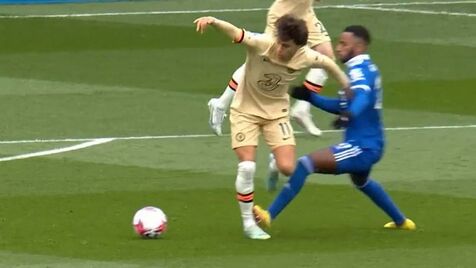The funny thing with the Romero situation is that the one against Arsenal, according to the rules, should be less of a penalty than the one they didn’t give us when we played them. Proximity, which they for some reason started talking about when we were involved, has never been used that way before. Proximity has always been about situations where a player is more or less standing still in a position before the shot is taken, where the player doesn’t have time to react because of proximity and pace. Romero just decided to go into the situation with his arms out, which should’ve been a clear penalty. It is beyond me how you can have two such similar situations and have VAR come up with different outcomes.
I can’t for the life of me understand why the Gusto situation gets upgraded to a red card, while Nketiah’s tackle where he comes flying in, barely misses the goalkeeper with his studs which are very high up his foot, and is then inches away from completely locking the goalkeepers foot between Nketias body and the grass, simply remains a yellow card. The distance he slides after the impact with the goalkeeper. It’s nothing but insane luck that the tackle attempt doesn’t end with a long term injury. Gusto is unlucky with the outcome, while Nketiah is insane with the way he goes flying in.
The only way to get rid of the problem is by removing the clear and obvious obstacle, which is meaningless, and use VAR as a proper tool where there is natural dialogue between the referee on the pitch and the VAR, rather than VAR being forced to consider clear and obvious before getting involved
I've just seen the Nketiah tackle as well and body weight going through a joint is much more dangerous than studs on an unplanted leg. Just look at how many injuries are caused by studs-up tackles as opposed to rolling ankles due to centre of gravity going through them. Garnacho and Eriksen were taken out by scissor tackles last season and missed about four months of football between them last season. But, considering that referees are too dumb to understand that I've just given up on anything being seen as dangerous that doesn't involve studs touching an opponent. And even then, it seems like hitting an opponent in the head is a mitigating factor (Haaland, Jota kicking opponents in the head, Azpi being knocked unconscious by a bicycle kick attempt, Shaw being struck in the head by a failed bicycle kick) in terms of being seen as dangerous. Those are things that endanger the safety of an opponent (red card according to the rules), but the referees seem to think that because their own heads are filled with nothing but air then the heads of footballers aren't anatomically important other than being used to head the ball.
The clear and obvious bar (or rather, the bar for intervention in general) is the biggest problem with all VAR implementation. In the CL, we see a situation where proximity would apply (Eriksen) being overturned because the bar for intervention is much lower there, and in the PL we see wildly different interpretations depending on who the ref is, which teams are involved and whether the VAR fancies checking a situation or not. We've seen situations that have definitely warranted intervention seemingly not even being checked because the ref just seemingly couldn't be bothered.
I've been banging on about this, but if we want VAR to be a tool where teams can stop feeling aggrieved by perceived injustices, the clear and obvious bar needs to go. They don't even want to re-referee the games, so why not put the system in the hands of a) the teams on the pitch, and b) the referee who has decided how he wants the game to be refereed on the particular day.
So how would we do that? Just make it so that pitchside reviews can be unilaterally triggered by a) the team that feels that they've been on the end of a poor decision, or b) the ref who might feel that he didn't have a great view of a situation. Remove the clear and obvious bar and just have the ref decide what's the more correct decision in relation to how he wants the game to be refereed.
When it comes to the "it'll take so much time if the ref runs out there every time" argument, let's take today as an example. If Arsenal had challenged the Romero handball, would it really have taken longer for the ref to run out there and watch the replays before deciding on the outcome? So much time is wasted by VARs deciding whether "clear and obvious" is satisfied, as opposed to deciding "is this a pen/red card?". Even if the ref doesn't think the Romero handball is unnatural, how the feck is he supposed to reject the review once every person at the Emirates knows that he's been sent out there because his colleague has told him he's made a clear and obvious mistake in not awarding Arsenal a penalty?
Obviously there would be a limit on team-initiated challenges, like two or three, but I would make it so that any decision can be reviewed. If you want to risk wasting it on a throw-in in the fourth minute, then don't cry when you're out of challenges when an Henry-handball-like situation happens in the 98th minute and you can't challenge it. And who are we to say what decisions may or may not be consequential? Imagine a team fighting relegation being 1-0 up in the 95th minute when the referee gives a corner to the opposition that is blatantly wrong. If the team wants to challenge that, why shouldn't they? Imagine they concede from a last minute corner and end up being relegated due to a refereeing mistake? What then? Tough titties?





